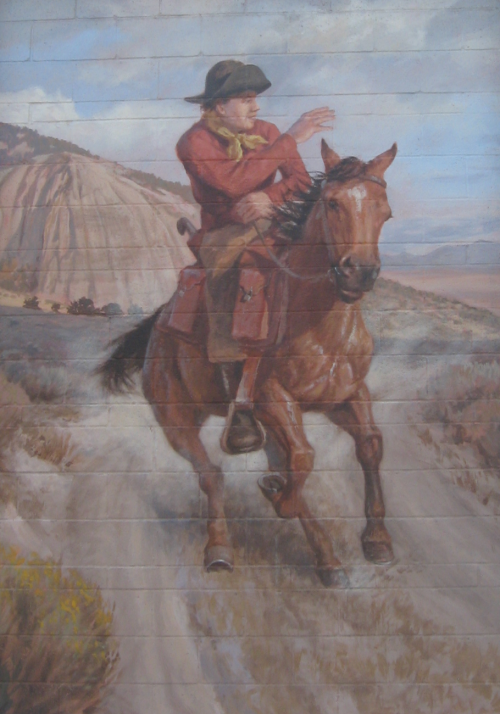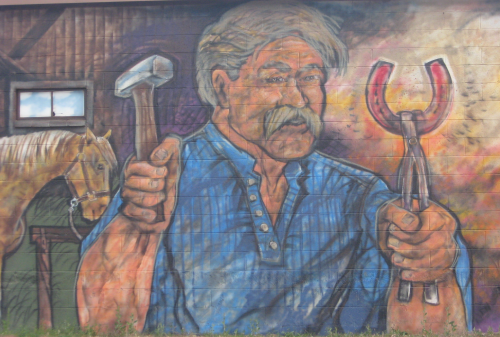Blue Highways: Leipsic, Delaware
Unfolding the Map
 A bit of a wistful post this time, as William Least Heat-Moon (LHM) passes a lonely lighthouse, far from water, on the edge of a cornfield. What can be more lonely than a lighthouse far from water? I guess we'll find out. To find Leipsic, follow the ghost light of the lighthouse to the map.
A bit of a wistful post this time, as William Least Heat-Moon (LHM) passes a lonely lighthouse, far from water, on the edge of a cornfield. What can be more lonely than a lighthouse far from water? I guess we'll find out. To find Leipsic, follow the ghost light of the lighthouse to the map.
Book Quote
"Although I couldn't see the bay, I could smell it and see evidence of it in an old steel lighthouse implausibly at the edge of a cornfield near Leipsic."
Blue Highways: Part 9, Chapter 12
 View of the Leipsic River near Leipsic, Delaware. Photo by "jgmskm" and hosted at Panoramio. Click on photo to go host site.
View of the Leipsic River near Leipsic, Delaware. Photo by "jgmskm" and hosted at Panoramio. Click on photo to go host site.
Leipsic, Delaware
Though I think I might have written this once before, I once ran across a DeMotivator poster that I thought was extremely funny. The poster showed a lone tree in the midst of a vast whiteness of snow. The caption read "If you find yourself struggling with loneliness, you aren't alone. And yet you are alone. So very alone." Part of what I found funny, aside from the biting humor, is that at certain points in our lives we sometimes find ourselves alone. Whether by choice, or by circumstances beyond our control, we may sometimes be in a place where suddenly it's only us. There are others who are just as alone as we are, and yet we are the center of our universe so it really is only us.
I was reminded again by that feeling in LHM's quote. By their very nature, lighthouses are lonely places. They usually sit on the edge of points or headlands, far away from other buildings or dwellings, and their lugubrious lanterns shine in a sweeping arc out into the vast and lonely reaches of the ocean, sea or lake they sit by. In days past, a lighthouse keeper lived out a lonely life in the lighthouse, tending the lantern in solitude, accompanied only by the sound of the gulls and the waves.
So what could be more lonely than a lighthouse left, by geology or environmental changes, sitting far inland? And what a perfect metaphor...but for what? Certainly for loneliness. Perhaps for the erosion of usefulness. Maybe the loss of meaningfulness, or the loss of purpose.
There are times when I feel like I could be such a lighthouse.
In another post, awhile back on our Blue Highways journey, I wrote about the difference between being alone and loneliness. In that post, I spoke about how being alone is a state of being - either we are with other beings or not. It may be by choice, as when I decide to go for a hike in the mountains to get away as much as possible from other people, or spend some time reading alone in a room in the house. Or it may be because we just find ourselves where other people aren't, and we can either choose to stay there or go in search of people.
But loneliness is a different matter. Loneliness is a state of mind. One can feel lonely in a crowd. One can feel lonely by themselves. It's a perception, and not based on the physical reality of place. Certainly there have been times that I've felt lonely. It's usually when I'm troubled by something, or I've done something that has placed me in some sort of bind. In that case, my feeling of being alone is also a symptom of my loneliness.
Of the two, I think that loneliness would be the worst. One can easily stop being alone by finding others. One must change a state of mind to stop feeling lonely. From experience, that can be very hard. And for some, it becomes chronic and depressive, and can lead to inner turmoil, pain, hurt and sometimes even tragedy. I try to avoid feelings of loneliness as much as possible.
I think that in his long Blue Highways journey LHM struggled at times with loneliness, especially when thinking about his estranged wife. In that way, the lighthouse serves as an apt symbol. A working lighthouse may sit alone on a headline, but its light shines and it is working, occupied with its sole duty of keeping ships off the rocks (I realize I'm anthropomorphizing lighthouses here, but go with me for a minute). However, a non-working lighthouse, sitting inexplicably inland has lost its purpose. It is there alone, without a reason for being. To me, that is the epitomy of loneliness. As LHM gets into the last stretch of his trip, he might be able to look at that lighthouse and see a bit of his former self in it. He started his trip in loneliness after his break up, but throughout the trip, his loneliness turned into an exercise of learning to be alone. He was the lonely lighthouse, and now he is something else. Perhaps he is alone, but he is not lonely.
But I ask you to think about the lonely lighthouses you have encountered in your life. How many times have you found yourself without a purpose, vision, or ability to break out of the lonely straights you've found yourself in. Have you ever known someone in that position? Perhaps a loved one, or an older person at the end of their life who has lost most of the people they've known and loved? Perhaps a friend who is going through a difficult time, and feels as if there is nobody there for them?
I think that, unfortunately, there are many lonely lighthouses in our society and world. We may not be able to control the changes that sometimes make us temporarily alone in the world, and sometimes we simply want to be alone. But loneliness is another matter, and when we lonely it often seems like we sit like an abandoned lighthouse, dark and lifeless, far away from the object of our purpose with no hope of ever reviving it. When that is our state of mind, perhaps we need another lighthouse to guide us - a purpose or a person - who can pull us out of the loneliness.
Musical Interlude
The most well-known song about lighthouses is probably James Taylor's Lighthouse. It is a very melancholy and nice song that captures a little of the loneliness of the lighthouse.
Here's another nice song, Lighthouse by The Waifs.
If you want to know more about Leipsic
Delawaretoday.com: Leipsic
Wikipedia: Leipsic
Next up: Dover, Delaware




 Friday, November 9, 2012 at 3:28PM
Friday, November 9, 2012 at 3:28PM



